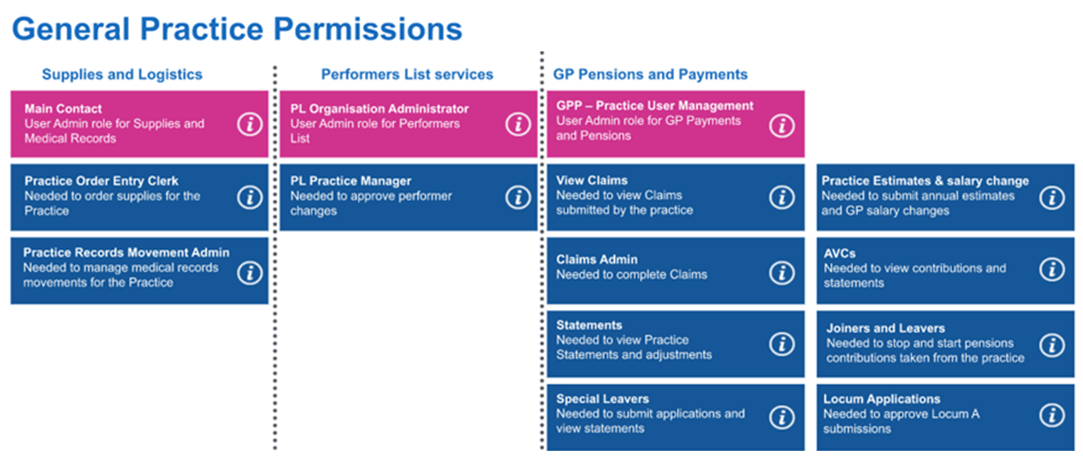PCSE updates on contact details and pooled lists
Correct contact details
Practices can improve communications with PCSE by ensuring that they have the most up to date practice contact details, including:
- The main practice contact
- All user administrators
- The designated Performers List approver
- The designated GP Payments & Pensions (GPPP) approver
These may be the same person. However, providing PCSE with contact details for each role will improve communications. As a minimum, PCSE would like the name of a user administrator for each of the following key areas:
|
Area within the practice |
Key contact |
|
Suppliers & Logistics |
Main Practice Contact |
|
Performers List |
PL Organisation Administrator |
|
GP Pensions & Payments |
GPPP Practice User Management |
All user administrators will need to be verified by PCSE by completing a form and getting Caldicott Guardian approval, and PCSE’s User Registration Team will work with you through this process if required.
In many practices the user administrator for these three areas will be the practice manager, but in some practices the role will be split across two or three staff members. It is important that PCSE has the correct contact details and information on the lead area for each person.
The user administrator role has to be set up on the system by PCSE. Once this is in place the administrator can decide whether to create other roles within the practice to spread the workload and allow the development of a relationship with PCSE. Such roles include the Performers List organisation approver and a GP Payments & Pensions (GPPP) approver.
Below is a page from PCSE’s user management guidance showing the tasks that fall in each role:

A Performers List Organisation Approver – is the person (often the practice manager) in the practice who addresses changes that affect the Performers List. This could include a new partner joining, a partner retiring, or a GP taking 24-hour retirement. Read further information on PCSE and the Performers List.
More information for practice managers, or other personnel taking on the Performers List Approver role is here.
A GP Payments & Pensions (GPPP) approver – is the person in the practice who is responsible for all aspects of payment and pensions. This can include bank detail changes, childhood immunisation payments, practice mergers, pensions online enquiries etc.
Giving PCSE the name and contact details of a dedicated person within the practice will help them communicate more swiftly, particularly if forms have not been correctly completed or they have any queries.
For each area, the PCSE team want the name of one person they can direct all correspondence to. If you have not already supplied the contact details of your user administrator(s) and a PL organisation approver and/or GPPP approver to PCSE then please do so as soon as possible even if this person is already on their data base as ‘practice manager’, ‘lead clinician’ etc.
Further information on PCSE and the Performers List.
Further information on user management.
Pooled lists
PCSE recommend that practices still operating personalised lists should consider moving to pooled ones. This subject was raised at a recent PCSE webinar, along with an eight-minute video on how to make the transition. The public questions and answers under the video may also be useful to practices.
Some of the benefits of having a pooled list are:
- No need to bulk transfer patients when a GP joins or leaves the practice.
- Practices can divide patients’ usual/named GP between salaried and partner GPs without notifiying PCSE.
- Reduction in errors on GP links (as nothing can be sent to invalid GP codes).
Latest LMC workforce survey - please complete our short survey by Tuesday 18 June 2019 (21 May 2019)
Thank you in advance for making space in your busy day to complete our short survey on practice workforce issues which will help us to gather insight to share with...Calling all Digital Leads, IT Managers and Practice Managers - digital round table on 3 July 2019 (21 May 2019)
We are hosting a digital round table event to discuss issues relating to expanding IT use in general practice. This is more than an information-sharing exercise with peers, it will...Londonwide LMCs' April 2019 Newsletter (17 Apr 2019)
...Practice Manager Leads Forum April 2019 meeting (17 Apr 2019)
April saw Practice Manager Leads Forum come together for discussions, updates and networking at the first of their 2019 meetings. Presentations included: Cervical screening updates and issues within the...Join our new Health Care Support Workers Forum (17 Apr 2019)
We are excited to announce the launch of our new Health Care Support Workers Forum (HCSW Forum) on Thursday 13 June. It is our pleasure to invite healthcare support workers, healthcare assistants,...Preventing type 2 opt-out codes being recorded in clinical systems (17 Apr 2019)
As we reported in our February 2019 newsletter, type 2 opt-outs have been replaced by the national data opt-out. This means that practices must not use the type 2...What state indemnity means for you (16 Apr 2019)
The Clinical Negligence Scheme General Practice (CNSGP) came into effect on 1 April 2019, meaning NHS Resolution will now settle most negligence claims against GPs undertaking NHS activities. GPs are...Tips of the month April 2019 (15 Apr 2019)
We provide weekly tips based on common queries which come through to us from London GPs and practice teams. These are shared via social media and collated for...Board update - April 2019 (15 Apr 2019)
Several key decisions affecting members were taken at the Londonwide LMCs Board of Directors meeting in March. These included: Increasing the hourly honoraria rate for LMC activity by £3...Guidance
We provide expert guidance for practices in our guidance section, as well as an archive of other materials you may find useful.
GP Support
Contact our GP Support team if you need help or advice.
The team provide professional and pastoral support to GPs and practice teams on a broad range of issues.

